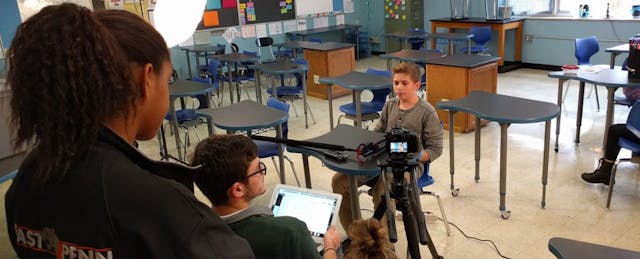Two years ago when Erick Hanson migrated from history teacher to media specialist he had one big goal in mind: to make the library cool again.
“If kids weren't coming into the library to check out books because they need the information or they just want to read for leisure, where are they going instead?” says Hanson, who works at Pennsylvania’s East Pennsboro School District, near Harrisburg.
In a mobile age, books and desktops weren’t much of a draw to the library, and foot traffic had seen better days. So he began wondering where kids were going instead and how he could meet them halfway.
“It didn't take long for me to boil that down to YouTube as the major place where they're consuming content,” says Hanson. “So the idea came about to turn our student consumers into creators.” That year he began EP Media, an after-school YouTube club for both middle and high school students that has blossomed into one of the district’s most hands-on, student-driven initiatives.
Much of that student-driven part is intentional. As far as facilitators go, Hanson is decidedly hands-off, preferring to let students figure things out for themselves. He has a spreadsheet with about 40 club member names, but he doesn’t tell them how often to come or how involved they should be.
“We're all self-taught, and it's all student run,” says Evan Haas, a former member who just graduated from the district’s high school in June. Each video the club makes gets a leader who creates a team of filmers, interviewers, editors and organizers to help wrangle subjects and locations, which lets them work on several projects at the same time.
“The reason we do it that way is because that's how Evan decided to do it,” explains Hanson, adding that he considers himself just another member of the team—albeit one with some special privileges and access.
Real-World Learning
Although the club is relatively new, it’s already spawned some four dozen videos both documenting big events and profiling individuals. For the most part, students create and execute video ideas by themselves, based on what interests them. But they’ve also been commissioned to do a couple of commercials and social-media-friendly spots for local businesses, which can come with generous donations. (The club is operated almost entirely through the $20,000 or so worth of grants they’ve managed to secure.)
Along the way, students are picking up plenty of the soft skills like collaboration and creativity that Hanson prizes, in addition to marketable skills such as using professional-grade cameras, video-enabled drones for aerial shots and Final Cut editing software.
“I pride myself on the fact that this program is so much more than about videos,” Hanson says. “It’s about these real-world learning experiences.” Case in point: students are encouraged to play leadership and team-member roles, often juggling both at once as they navigate several projects.
“Learning your role in the project is an important part” of the process, explains Nick Demarchis, another newly-minted graduate of East Pennsboro High, who is attending Bucknell University in the fall. “When it's your video you want it how you want it, but when it's not your video it’s really working with a team to figure out how to best get [their] idea across. Because in the end, it's someone's idea you're trying to get out there.”
One of the hardest parts for Hanson is letting students fail, or do something he knows might not work out. But, he reasons, there’s a better lesson in letting students figure it out for themselves. Just ask Demarchis, who wanted to make a montage of every teacher giving one word of advice for his graduating class. That didn’t work out exactly as expected—it was hard to pin down times for them to be filmed—so he used a few clips of teachers within a larger, more poignant tribute to his class.
Yet often students have experienced the opposite problem: It’s easy to shoot footage, but much more difficult to create a compelling narrative to go along with it. “It does not come naturally,” Demarchis says of writing treatments and scripts. “It's something you can only get with the help of other people with different perspectives.”
And thanks to their experience in the club, neither Demarchis or Haas wants to give up telling stories and making media now that they've graduated. “I go places and I think ‘this would make an awesome video,’” Haas says. “Now I'm able to create the videos and make them mine, and that really makes me happy.”


